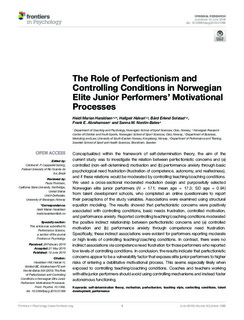The Role of Perfectionism and Controlling Conditions in Norwegian Elite Junior Performers’ Motivational Processes
Haraldsen, Heidi Marian; Halvari, Halgeir; Solstad, Bård Erlend; Abrahamsen, Frank Eirik; Nordin-Bates, Sanna M.
Journal article, Peer reviewed
Published version
Permanent lenke
http://hdl.handle.net/11250/2636447Utgivelsesdato
2019Metadata
Vis full innførselSamlinger
Sammendrag
Conceptualized within the framework of self-determination theory, the aim of the current study was to investigate the relation between perfectionistic concerns and (a) controlled (non-self-determined) motivation and (b) performance anxiety through basic psychological need frustration (frustration of competence, autonomy, and realtedness), and if these relations would be moderated by controlling teaching/coaching conditions. We used a cross-sectional moderated mediation design and purposefully selected Norwegian elite junior performers (N = 171; mean age = 17.3; SD age = 0.94) from talent development schools, who completed an online questionnaire to report their perceptions of the study variables. Associations were examined using structural equation modeling. The results showed that perfectionistic concerns were positively associated with controlling conditions, basic needs frustration, controlled motivation, and performance anxiety. Reported controlling teaching/coaching conditions moderated the positive indirect relationship between perfectionistic concerns and (a) controlled motivation and (b) performance anxiety through competence need frustration. Specifically, these indirect associations were evident for performers reporting moderate or high levels of controlling teaching/coaching conditions. In contrast, there were no indirect associations via competence need frustration for those performers who reported low levels of controlling conditions. In conclusion, the results indicate that perfectionistic concerns appear to be a vulnerability factor that exposes elite junior performers to higher risks of entering a debilitative motivational process. This seems especially likely when exposed to controlling teaching/coaching conditions. Coaches and teachers working with elite junior performers should avoid using controlling mechanisms and instead foster autonomous functioning.
Beskrivelse
his is an open-access article distributed under the terms of the Creative Commons Attribution License (CC BY). The use, distribution or reproduction in other forums is permitted, provided the original author(s) and the copyright owner(s) are credited and that the original publication in this journal is cited, in accordance with accepted academic practice. No use, distribution or reproduction is permitted which does not comply with these terms.

